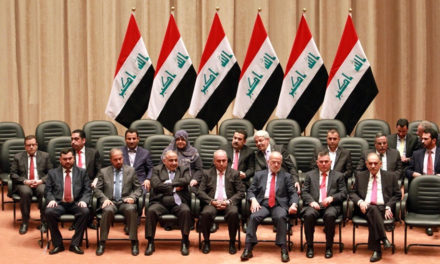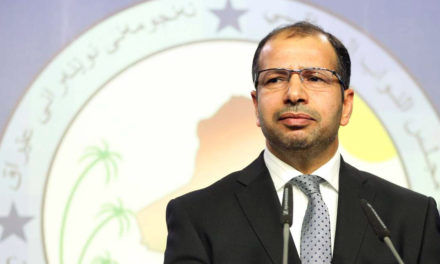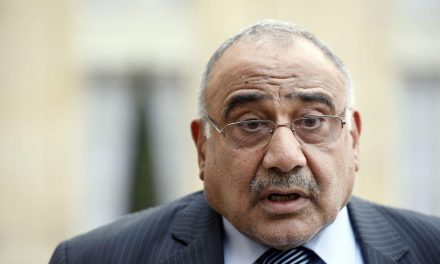(Photo: Ahmad al-Rubaye/AFP)
There is some glimmer of hope this year with temporary ceasefires in Lebanon and Palestine, but the region remains volatile. Iraq, which has enjoyed relative stability since 2022, will have to continue managing international relations to safeguard itself from the regional conflict that has engulfed neighboring countries over the past year. Iraq has largely escaped the violence, allowing it to provide refuge for tens of thousands of Lebanese and attempt to get humanitarian aid to Palestine. Iraq also exerted diplomatic efforts to push for a ceasefire. 2025 will be no different for Iraq, as its foreign policy goals will be to preserve security, ensure that the ceasefires become permanent, and that humanitarian aid can be delivered to Palestine and Lebanon.
The war in Gaza has disrupted the whole region and has put the world in a humanitarian, political, and moral crisis. Countries in the region have been continuously attempting to pressure Israel to stop the genocide it is committing against the Palestinian people either through military, diplomatic, or public pressure means. As Iraq finds itself strongly impacted by the instability in the region, it has worked on global summits to contribute to the efforts aiming to stop the war on Gaza and South Lebanon, and that will likely change very little. Baghdad will be the next location of the Arab League Summit in 2025 and Iraq recently became the chair of the G77 group for 2025 at the UN. It should, and probably will, use these platforms to highlight the suffering of the Palestinians and Lebanese.
The regime change in Syria was a seismic development for Iraq, as Iraqis watched the frozen conflict turn into a blitz operation that removed the Ba’ath regime from Syria and instead, put various groups at the helm who are regarded as hostile to many in Iraq. As Iraqis followed the fast pace of development in Syria, they reflected on similar developments in 2003, when the Iraqi Ba’ath regime was toppled by an American-led coalition. Although their dreams for a better future were deferred by a series of devastating conflicts, the security situation did finally improve. Iraq has taken a cautiously accepting stance despite all the reservations towards the new reality in Syria, by sending its Intelligence Chief Hamid Al-Shatri to meet with the de-facto Syrian leadership.
Nevertheless, Iraqis have a collective fear that the Syrians might face a similar destiny to Iraq post-regime change and that the conflict might spill over again to their country, just as it did with the rise of ISIS in 2014. Therefore, it is in Iraq’s strategic interest that the Syrians avoid this pitfall and learn from Iraq’s lessons. It is unclear how the events in Syria will unfold, what the shape of the political system will be, and therefore Iraq will be extra vigilant in preventing a security deterioration. Having said that, as Iraqis have been subject to foreign intervention in the past, they understand the importance of enabling the Syrian people to practice their own agency to manage the transition period the best way possible. Therefore, it would not be out of the ordinary if Iraq offers diplomatic or even economic support to Syria in this transition period. By the time the 34th Arab League Summit is held in Baghdad, the Iraqi government will have developed an approach to Syria, which will be reflected during the discussions held in the Iraqi capital.
Beyond its Arab neighbors, Iraq will have to deal with its relations between Iran and the United States. The new U.S. administration has been hinting that it would take a more stringent approach towards Iraq’s purchase of Iranian gas and electricity which has been exempted in the past from the sanctions. While Iraq places importance on economic ties with Iran, it makes sense for Iraq to develop its own gas infrastructure and enhance its electricity production capacity. Apart from avoiding being target to U.S. sanctions, Iran itself has been having shortages in supply for its domestic needs, and has repeatedly stopped its export to Iraq, causing instability in Iraq’s power grid. Beyond just using Iraq’s own sources to meet its own demand, the world is in need for more gas supplies due to the war in Ukraine, and future conflicts can disrupt global markets more. Iraq would be well positioned to enter the global gas market to substitute some of the shortages. More importantly, Iraq should have better use for its own gas instead of flaring it, which is causing air pollution, an issue that has not been tackled fast enough.
As evidenced by the war with Israel in Gaza and Lebanon, the developments in Syria, and the need to purchase gas from Iran, foreign affairs impact domestic affairs in Iraq. Iraq will have international tools like chairing the G77 and hosting the Arab League Summit to help it manage international relations and tackle foreign crises to ensure a more stable region. Stability will be important as Iraq is scheduled to hold federal elections in the autumn of this year. As we near elections, there is a maturing among the Iraqi public and its leadership, that approaching international matters with the least negative blowback on Iraq is the best path forward. Iraqis are proud people and staunch advocates of the Palestinian cause. This will not change, but efforts to support the Palestinian people will be done in ways that don’t jeopardize hard-earned Iraqi stability and that place Iraq in a position of strength to advocate for Palestinians.

Muhammad Al-Waeli
Muhammad Al-Waeli is an analyst. He comments on issues of authority, policy, and institutions in Iraq. You can follow him on Bluesky: @alwaeli.bsky.social










